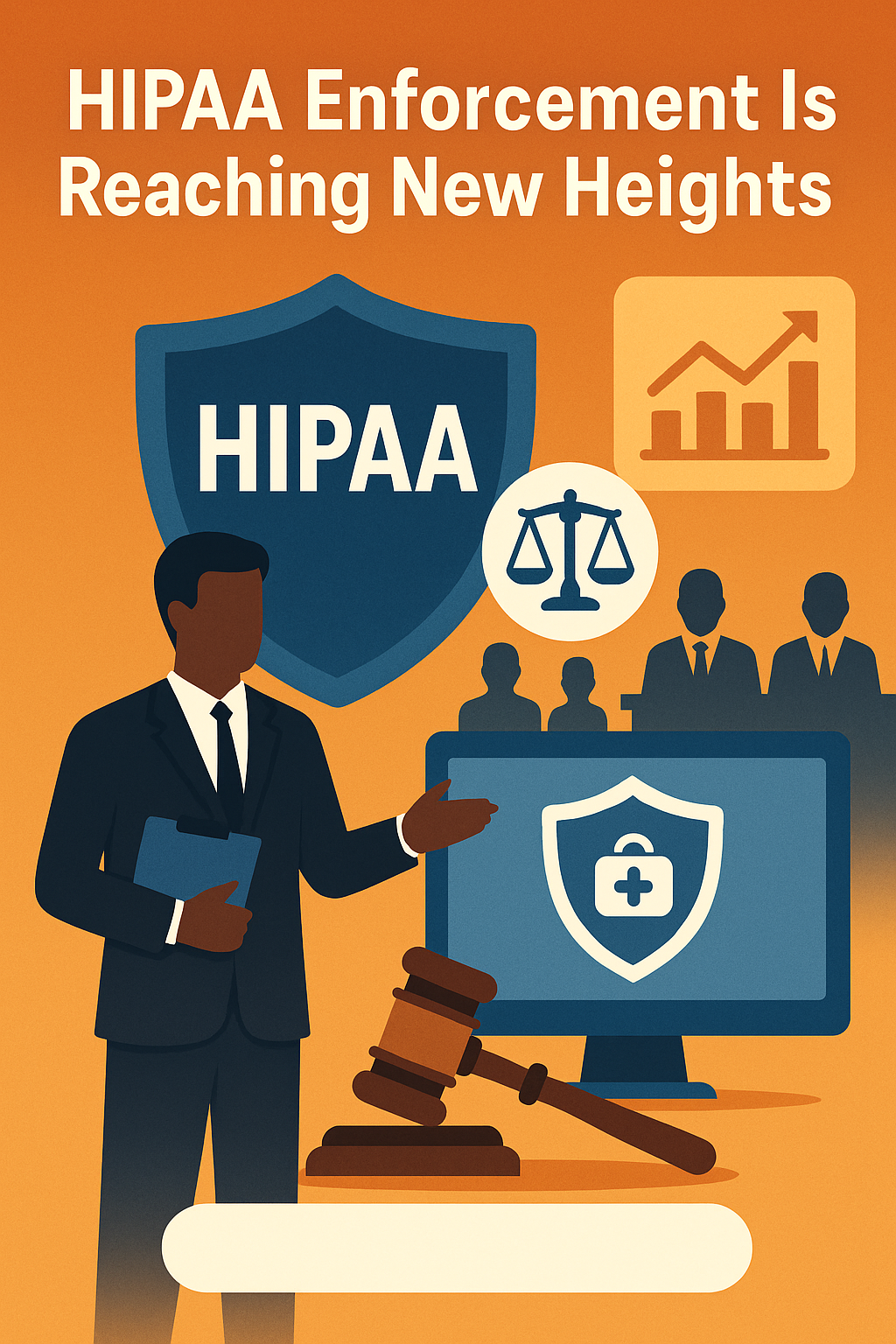HIPAA Fines Are Rising And Most Violations Start With Untrained Employees
HIPAA Enforcement Is Reaching New Heights
In recent years, HIPAA enforcement has become increasingly aggressive. The U.S. Department of Health and Human Services (HHS) and the Office for Civil Rights (OCR) have significantly increased audits and investigations across the healthcare industry. Many organizations are being caught off guard by the rising costs of non-compliance. These fines can reach millions, and in most cases, the root cause is preventable.
The Real Cost of HIPAA Violations
HIPAA penalties are steep, and the financial damage can be long-lasting. Violations of HIPAA rules are often the result of human error or insufficient training. In many instances, it's a single employee's mistake that compromises protected health information (PHI), triggering breach notification rules and penalties.
Common Violation Examples:
- Improper disposal of medical records
- Unauthorized access to patient files
- Lost or stolen unencrypted devices
- Discussing PHI in public spaces
Employees Are Your Greatest Vulnerability
Most HIPAA violations begin with untrained employees who don’t understand the regulations. Without proper HIPAA training, staff may unknowingly violate privacy and security policies. This lack of awareness can expose sensitive health information, compromise systems, and trigger a federal investigation.
HIPAA Training Is Not Optional
HIPAA training is a legal requirement under the Health Insurance Portability and Accountability Act. It applies to all employees of covered entities and business associates. Organizations that fail to provide thorough HIPAA training put themselves at risk for serious enforcement actions.
Why HIPAA Training for Business Associates Matters
Business associates play a key role in processing, storing, or handling protected health information. HIPAA training for business associates ensures these third-party partners understand their responsibilities under the HIPAA privacy rule, the HIPAA security rule, and other HIPAA regulations.
Understanding the HIPAA Security Rule
The HIPAA security rule mandates specific administrative, technical, and physical safeguards to protect electronic PHI. Without proper training, employees often neglect these security protections, leaving systems exposed to unauthorized access, breaches, and ransomware attacks.
The Privacy Rule and Daily Responsibilities
The HIPAA privacy rule governs how health information PHI can be used and disclosed. Employees who don’t understand what HIPAA stands for, or what the privacy rule requires, often mishandle data. This mismanagement creates risk for healthcare providers, health plans, and other covered entities.
Training Needs to Be Ongoing and Role-Based
A one-time HIPAA training class isn’t enough. Training must be updated regularly to reflect changing HIPAA requirements, new threats, and evolving workflows. Tailoring the training program to specific job roles ensures staff receive relevant, actionable information.
Free HIPAA Training Isn't Always Enough
While free HIPAA training may be appealing, it's often too general or outdated. A comprehensive online course that includes current HIPAA compliance mandates, real-world scenarios, and knowledge checks is a better investment for long-term security and compliance.
Key Elements of a Successful HIPAA Training Program
To ensure compliance and reduce liability, your training materials should cover:
- HIPAA regulations and rules
- How to recognize and report breaches
- Physical and technical safeguards
- Employee responsibilities under the privacy rule and security rule
- Business associate agreements
HIPAA Online Training Makes It Easier to Comply
Online training offers flexibility, allowing employees to complete the course at their own pace. A HIPAA online training solution is especially useful for healthcare professionals with demanding schedules. The self-paced format also supports better knowledge retention.
Certificates Prove Compliance
Upon successful completion of a HIPAA training class, employees should receive certificates that document their training. These certificates demonstrate due diligence during audits and provide proof that your organization has taken the required steps to comply.
Don't Wait for a Breach to Start Training
Many organizations only focus on training after a breach has occurred. By then, it’s too late. Prevention through proactive HIPAA training is far less costly than responding to an investigation or penalty.
The Omnibus Rule Expanded Liabilities
The HIPAA Omnibus Rule increased enforcement against business associates and subcontractors. That means your organization can be held liable for breaches caused by your partners. Ensuring that business associates receive proper training is now more critical than ever.
Real Cases Highlight the Consequences
Several high-profile cases have resulted in fines exceeding $1 million due to simple employee mistakes. In each instance, investigators concluded that proper HIPAA training and security protocols could have prevented the violation.
Training Reduces Risk Across the Board
HIPAA training helps employees recognize phishing attacks, avoid data loss, and understand their access limitations. Well-informed staff are more likely to follow procedures, report suspicious activity, and protect patient data proactively.
Building a Culture of HIPAA Compliance
Compliance is not just about checking boxes. It requires a culture where privacy and security are part of daily routines. Leadership must emphasize the importance of HIPAA regulations and provide continuous education to support that goal.
Healthcare Providers Face Unique Risks
Doctors, nurses, and office staff regularly handle sensitive patient data. They need training tailored to their specific responsibilities under the security rule and privacy rule. Healthcare providers who neglect this are often the first to face costly audits.
Covered Entities Must Lead By Example
Covered entities, including hospitals, clinics, and insurance companies, set the tone for HIPAA compliance. By investing in professional training programs and holding business associates accountable, they can drastically reduce risk.
HIPAA Training Is an Investment in Your Organization
Providing high-quality HIPAA training protects your brand, your patients, and your bottom line. It reduces the likelihood of violations, helps you comply with the enforcement rule, and provides peace of mind that your employees are prepared.

Civil Rights and HIPAA Violations
HIPAA is not just a technical law—it's tied to civil rights protections. Mishandling PHI can lead to broader discrimination issues and legal consequences. Proper training ensures your staff understands both the legal and ethical stakes.
Regulations Are Only Getting Stricter
With the healthcare industry increasingly targeted by cyber threats, regulators are tightening HIPAA requirements. Staying compliant now requires more than just policies—it demands knowledgeable, trained employees at every level.
Your Organization Can't Afford to Be Reactive
Waiting until a breach or audit to implement training puts your organization in serious jeopardy. Proactive, ongoing HIPAA training ensures compliance, protects PHI, and supports long-term business continuity.
Complete Training Is the Key to Avoiding HIPAA Violations
To stay compliant, your organization must offer complete HIPAA training—not just the basics. That means covering every essential rule, including the privacy rule, security rule, and breach notification requirements. A complete training program prepares employees for real-world situations and reduces the chances of accidental violations. When your team understands how to protect health information and respond to potential threats, you build a stronger foundation for compliance and trust.
Certification Strengthens Your HIPAA Compliance Strategy
Earning a certification in HIPAA compliance shows that your employees have completed verified training and understand their responsibilities under HIPAA rules. Certification adds credibility during audits and can serve as proof of due diligence when facing regulatory scrutiny. It’s not just about completing a course—it’s about demonstrating that your organization takes privacy and security seriously. HIPAA training that includes certification ensures that every team member has the documented knowledge needed to handle protected health information safely and legally.
Understanding Health Insurance Portability and Its Role in HIPAA
The Health Insurance Portability and Accountability Act was designed to improve health insurance portability for employees moving between jobs, while also setting strict standards for the privacy and security of health data. This dual purpose makes HIPAA training even more essential for employees who handle sensitive information. Without a clear understanding of health insurance portability, many staff members miss the broader context behind HIPAA rules and why compliance matters. By educating your team on both the portability and privacy aspects, you reinforce the importance of following HIPAA requirements in every interaction with patient data.
Why Understanding HIPAA Rules Is Critical for Your Entire Team
HIPAA rules were established to safeguard patient information and ensure that healthcare organizations manage data responsibly. These rules cover everything from how protected health information is accessed, stored, and shared to how organizations must respond to breaches. Employees who aren’t trained on HIPAA rules can unintentionally cause violations that lead to major fines and reputational harm. Regular HIPAA training ensures your team is aware of the latest guidelines and how to apply them in real-world situations, helping your organization remain HIPAA compliant and legally protected.
Contact Us for HIPAA Training Support
At Masterly Consulting Group, we understand the urgency around HIPAA compliance and employee education. Our HIPAA training for business associates and covered entities is designed to reduce your risk, improve security, and meet evolving regulatory demands.
Whether you need a full training program, refreshers for long-time staff, or certification documentation, our team can help. We offer flexible training solutions that support real-world compliance in the healthcare industry.
Contact us at (888) 209-4055 to book a free consultation. We’ll answer your questions and help you build a HIPAA-compliant workforce that protects your patients and your organization.







